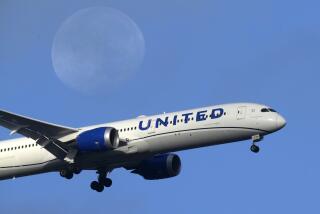Why Frequent Fliers Are Frequently Denied
- Share via
A few weeks ago, having accumulated more than 90,000 miles in the TWA frequent-flier program, I decided to reward myself with a “free” trip to Europe.
I called the toll-free number at the TWA frequent flier award desk. I confirmed that I did indeed qualify for the European trip. But when I then called the TWA reservation number to book my flight I was told that there were no seats available for London.
“How about the next day?” I asked. Negative. And there were no seats for the following day. In fact, according to the TWA reservations agent, there might not be any seats available until October.
October? I redialed the TWA reservation number, did not identify myself as someone attempting to redeem a mileage award and asked if seats were available to London on my original flight date.
They were. And seats were also available on every other date I selected. What had happened? I had become the latest victim in the frequent flier award redemption Catch-22: You can win the award, but you may not be able to use it at your convenience.
In the eight years since they began, frequent flier programs have become probably the most popular marketing tool ever created by the airlines.
There’s no doubt that the individual programs have built passenger loyalty, but the big question is whether they are rewarding it.
Chances are that you’ve never heard of the Hope Letter. Lately, the document has been circulating among certain travel agents angered about what they consider to be frequent flier program abuses by airlines, and a copy found its way to my desk.
It was a letter authored by Robert Hurd, American Airlines’ managing director of general accounting. The bulk of the letter addressed how American financially accounted for its frequent flier “Advantage” program.
But in one revealing paragraph Hurd described American’s philosophy about the redemption of mileage awards.
“In a frequent-flier program,” he wrote last January, “the most that is offered to a FFP member is the hope that they will in some way benefit from the program. They must hope that they will take enough trips to earn an award. They must hope that the program doesn’t cease before enough miles are accumulated for an award.
“The FFP member must hope that American will not have blocked usage of travel awards at the time they would like to use the award. And they must hope that American doesn’t change the number of miles needed to earn an award.”
Hurd’s Hope Letter seems to state the situation precisely for all airlines and their frequent flier program members. Indeed, not a week goes by without this column receiving letters of complaint by frequent fliers who have experienced similar frustrations trying to redeem airline, hotel or rent-a-car awards earned with airline miles.
A few years ago many airlines--trying to limit the large mileage liability they had incurred--tried to change eligibility and mileage requirements for trip awards. Suddenly a trip for two to Hawaii, which had once required 75,000 miles, would only be rewarded at 90,000 miles.
Frequent fliers were incensed. Some of them, who just happened to be lawyers, filed class action lawsuits against some of the airlines, including United.
In the United case the airline was charged with breach of contract. Other awards were also affected. A mileage award of a cruise, once redeemable for 150,000 miles, had doubled to 300,000 miles. TWA, which tried to limit who could use a mileage award, was also sued.
The airline required that people who earned frequent flier awards had to use the tickets themselves or give them to a relative with the same last name. TWA was sued by a homosexual couple who claimed that the program discriminated against them. United settled the suit two months ago.
And in July TWA announced a change in policy that now allows its frequent fliers to use their mileage awards with companions of their own choosing. In the United suit the airline agreed to reverse its earlier action and permit its “mileage plus” members to claim mileage awards under the old rules.
A group of state attorneys general also got into the act, and issued a mandate that forced airlines to give frequent fliers at least a year’s notice before changing mileage level and redemption rules.
One would think that the lawsuit settlements, coupled with the mandate, would have made things better. Not necessarily.
Yes, the airlines did roll back the mileage levels. And yes, the airlines now give 12 months’ notice for rule changes. But that hasn’t made getting a mileage award flight any easier.
Why? In the case of United, while it did reverse its earlier decision to raise mileage award levels, it did other things as well . . . none of them in your best interests. For starters, United shortened to six months (from one year) the period in which an award certificate must be used. It also changed upgrading procedures.
Passengers can no longer use an upgrade certificate to fly first-class if they are traveling on a heavily discounted coach ticket. And last but not least, United began heavy “capacity controls.” What this means is that the airline has severely limited the number of seats on each flight that can be used by redeeming frequent flier awards.
To be sure, United isn’t alone. Just about every airline has begun strict capacity controls.
How do you beat the airlines at their own games? Approach the frequent flier programs the way you would handle the consumer indifference you’d expect from any other large public utility.
If you’re not satisfied with the responses you get, ask to speak to a supervisor, and then to speak to the supervisor’s supervisor. In each frequent flier program there is someone who can help you, especially in cases of capacity control and in cases where the flier had accumulated an impressive number of miles.
Clearly, this isn’t a solution to the bigger problem. The U.S. Department of Transportation is investigating airline frequent flier programs. And other lawsuits, challenging the airlines’ policy of blackouts and capacity controls, are pending. Stay tuned.
More to Read
Sign up for The Wild
We’ll help you find the best places to hike, bike and run, as well as the perfect silent spots for meditation and yoga.
You may occasionally receive promotional content from the Los Angeles Times.






